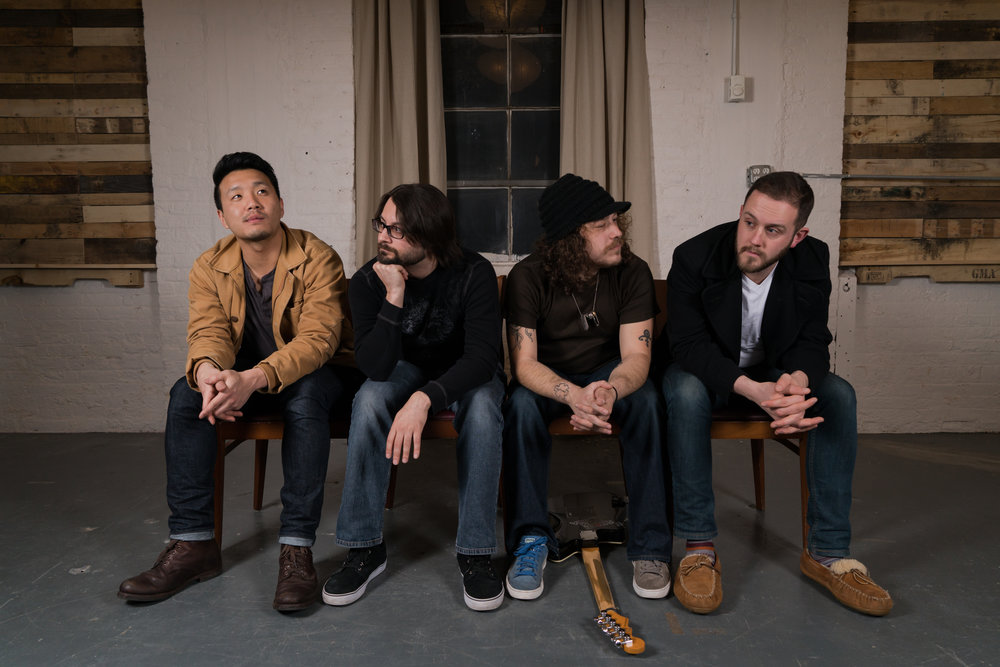
BETAMAX: Musician/Producer Max Feinstein Finds A Little Time for Himself With New Project
Max Feinstein has made a name for himself as a resident chef of the Hudson County music scene—always in the kitchen wielding the spoon that stirs chili pot, meanwhile adding his own distinct flavor to a number remarkable projects.
With his latest release, BetaMax, Feinstein has taken the time and effort to slow-cook his own exceptionally tasty dish. As always, he’s willing to share.
We were able to catch up with Max—between production at Silver Horse Sound, a prolific number of gigs, tapings of his Maxwell’s House podcast, and his voracious consumption of hot sauces—to get the tale of the tape on BetaMax.
hMAG: It’s been over five years since your last release of your own original music. How have these tracks developed throughout that period, and how did you decide that they were ready?
 Max Feinstein: We’re coming up on the 7-year anniversary of my first release, Round of Sound. I had talked about doing a follow up named BetaMax pretty early on, and worked on new songs, but didn’t commit to the project until 2018 at the insistence of my long time friend and collaborator, Jake Sachs, and didn’t define it until 2019 when I decided to pair a bunch of material down to something I thought cohesive at three songs.
Max Feinstein: We’re coming up on the 7-year anniversary of my first release, Round of Sound. I had talked about doing a follow up named BetaMax pretty early on, and worked on new songs, but didn’t commit to the project until 2018 at the insistence of my long time friend and collaborator, Jake Sachs, and didn’t define it until 2019 when I decided to pair a bunch of material down to something I thought cohesive at three songs.
It’s kind of a suite. The three songs on BetaMax were composed during about a year’s timespan of 2013-2014 to about 90% of the way you hear them on the EP. The first song, “Drone,” actually started as a lengthy intro instrumental passage that was meant to start the second song, “Spratz,” but I decided to make it its own song early on.
The majority of the lyrics were written in the middle of 2019. Some of them committed to as I got into the booth to record them. In the intervening 5-6 years, my relationship with the material evolved and the meanings behind the songs changed.
h: You’ve said that you “had retired myself as a singer songwriter for half a decade so that I could develop more as a musician and a human being.” In what ways have you grown?
MF: I’m calmer now. I’d like to think I’ve gotten smarter to some extent with age. I’m probably more accepting of myself and the world around me, too.
I guess it’s only partially true that I retired myself for the above reason. I never stopped writing really. I contributed an original song to a compilation record, and co-wrote in a few bands in the intervening years because those opportunities came my way and they were more appealing than my own work.
An unfortunate part of the story is that I absorbed a lot of harsh criticism from some people close to me and became demotivated in being my own singer and songwriter because it hurt that some of these people just didn’t get it. Objectively though, the other bands I was working with had more traction and gave me the opportunity to gig and tour, which really gave me some vital life experience.

h: You’re a collaborative musician, working with a number of artists on their own projects. With whom did you collaborate on BetaMax, and how did those individuals fit into your vision for the EP?
MF: Everyone I work with shows me a high degree of trust and vulnerability, letting me work on their music. I decided to honor that sentiment by inviting the collaborators on my EP to express themselves within my vision. Jake, my mix engineer and co-producer, is a friend and collaborator of nearly two decades, and he was particularly keen to make his sonic mark on my work. I wanted to share in that faith and vulnerability, I guess.
 h: How has The Latest Noise facilitated the creative/production process for you and others here in Hudson County?
h: How has The Latest Noise facilitated the creative/production process for you and others here in Hudson County?
MF: Kuz (Mike Kuzan) got people talking to each other and congregating. Songwriters just kept showing up. That’s what motivated me to start gigging out under my own name and got this whole thing started again for me.
h: What insight would you have for anyone reading this right now who might have a project stuck in their own creative pipeline?
MF: I like to ask questions that have easy answers. what’s holding you back right now? What’s the most immediate and actionable thing you can do to get things moving? Have you done the best you can? It’s important to me to show a continuity of growth rather than wait for perfection, and I encourage the same.

BWQ
h: Among your collaborations is BWQ—can you explain the significance of the BWQ hot sauce? With your intimate knowledge of hot sauces, what are your top five?
MF: I like this question.
The BWQ sauce gives Darryl (Joo) an opportunity to share some of his Korean heritage with people. It also gives people another opportunity to interface with the band name so it’s less obtuse.
 I’m not gonna put them in order, but here are some favorites
I’m not gonna put them in order, but here are some favorites
- BWQ sauce: stands out for having a solid flavor profile and a heat that kicks at the get go but doesn’t escalate. Great for wings
- Sriracha: Classic. Not too hot. Full of flavor. I use this in my meal planning to break up the monotony.
- General Tso’s sauce: not just for chicken.
- Volcano Dust: pure Carolina reapers crushed into a powder. Not a sauce, but a little bit in a big pot gives you a great kick without adding any flavor.
Bonefire Smokehouse’s Razzleberry: one of a few excellent homemade sauces only found at the titular restaurant in Abingdon VA. It’s so good I’m drooling thinking about it
To add, I’ll never kick a hot sauce out of bed…

***

 Previous Article
Previous Article Next Article
Next Article KARYN KUHL: The Big Personality Behind Little RocknRollers
KARYN KUHL: The Big Personality Behind Little RocknRollers  ASK YOUR BARTENDER: Bin 14’s Joel David Liscio
ASK YOUR BARTENDER: Bin 14’s Joel David Liscio  WORLD CHAMPION VIEW: Eli Manning Sells Hoboken Apartment
WORLD CHAMPION VIEW: Eli Manning Sells Hoboken Apartment  KNEEL BEFORE HEAVYHEAD: Sylvana Joyce + The Moment Bring Their Powerful New Album To Life — SATURDAY, DECEMBER 16th @ MAXWELL’S
KNEEL BEFORE HEAVYHEAD: Sylvana Joyce + The Moment Bring Their Powerful New Album To Life — SATURDAY, DECEMBER 16th @ MAXWELL’S  Former Running Mate John Allen Named as Bhalla’s Chief of Staff
Former Running Mate John Allen Named as Bhalla’s Chief of Staff  ASK YOUR BARTENDER: Hoboken Bar & Grill’s Veronica Mirasol
ASK YOUR BARTENDER: Hoboken Bar & Grill’s Veronica Mirasol  CAROLINE CAULFIELD: Born & Raised to Serve as Hoboken’s Chief of Constituent Affairs
CAROLINE CAULFIELD: Born & Raised to Serve as Hoboken’s Chief of Constituent Affairs  GANG STAR: Hoboken’s Gianni McLaughlin Brings the Fight to the Peaky Blinders
GANG STAR: Hoboken’s Gianni McLaughlin Brings the Fight to the Peaky Blinders